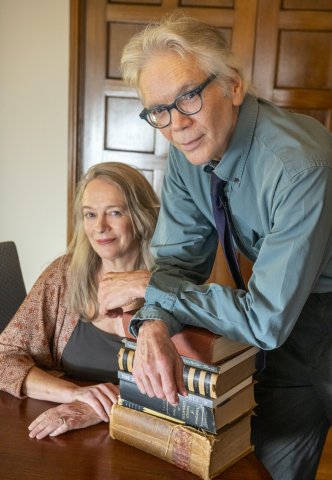Poetic Justice - When Art Is Everything
Vignettes of Robert Lowell and Rainer Maria Rilke
By: Victor Cordell - Jan 10, 2023
In the past, we exchanged letters – luxuriant, literate, thoughtful, compassionate missives. They especially sparkled when crafted by artistic minds. Thomas Jefferson’s note to a correspondent attests the goal of clever and succinct erudition when he apologized, saying that if he had more time, he would have written a shorter letter. As static as the notion of portraying two people exchanging letters on stage may seem, the theme has been successfully dramatized. One of particular relevance, Sarah Ruhl’s “Dear Elizabeth,” reveals the loving relationship between poets Robert Lowell and Elizabeth Bishop, whose platonic amor spanned decades and distance, with little physical togetherness.
Premiering at San Francisco’s The Marsh, both of Lynne Kaufman’s plays, packaged together under the title “Poetic Justice – When Art is Everything” connect to “Dear Elizabeth.” Like Ruhl’s work, the first play, “You Must Change Your Life,” reflects on letters – these between Bohemian-Austrian poet Rainer Maria Rilke and then military cadet and aspiring poet Franz Kappus. The second, “Divine Madness,” takes poetic license in conceiving conversations between Robert Lowell and his ex-wife, book critic Elizabeth Hardwick, with cautionary entreaties of Elizabeth Bishop in the background.
With only a couple of props and a little blocking here and there, the production of both one-act, two-handers is virtually unstaged. You won’t need to check your watch, as they are brief and engaging. The performances are exquisite, with Charles Shaw Robinson playing the esteemed figures and Julia McNeal portraying the less known but also significant literary artists.
Which actor performs better is a matter of subjective criteria. Robinson differentiates his portrayals more and looks highly convincing as both characters. He excels as Rilke with his soft, cultivated German accent, suggesting a bit of ramrod intellectual arrogance, but betraying a history of suffering. As Lowell, he seems more relaxed and naturalistic but with occasional fits of extremes, reflecting the Boston Brahmin’s bipolar disorder, which dogged Lowell throughout his life.
McNeal’s characterizations are less divergent, yet well differentiated. Two anomalies mark her portrayal of Kappus in “You Must Change Your Life.” Her character is a male teenager, which is not adequately clarified at first. Her mature, feminine bearing, as well as references to the character being in the military in turn-of-the-century Austria don’t naturally mesh. Yet, without mimicking a male youth, she makes the passionate depiction work nicely. McNeal does not use a German accent, which perhaps she doesn’t feel comfortable with, or maybe Director Lauren English decided that two foreign accents would make the exchanges too taxing for the audience. In any case, that conceit works well as well. McNeal’s Elizabeth Hardwick conveys an approach-avoidance clash in her relationship with Lowell that she executes with sensitive frustration and attachment.
The very short Rilke piece, which serves as the basis for his most widely read work, “Letters to a Young Poet,” acts as the warm-up. It lacks much topography or interaction, but the characters do engage the audience, and the messages resonate. Rilke advocates living a Godly life “in ever expanding circles” and in helping others. His many deeply introspective and eloquent letters of encouragement to an unknown boy were clearly altruistic, but it is otherwise not clear how closely he heeded his own counsel. In the parlance of philosopher Joseph Campbell, Rilke’s most important advice focuses on following one’s bliss. In particular, he challenges Kappus to “Confess to yourself if you would have to die if forbidden to write.”
In “Divine Madness,” the two characters do interact organically and with greater animation. Conflict reigns as Lowell attempts to reconnect with Hardwick, having betrayed his ex in life and in literature, the latter being his Pulitzer Prize winning yet biased tell-all, poetic tome, “The Dolphin.” But his agendas are transparent, and Robinson effectively reveals Lowell’s manic side in the process. Hardwick parries his advances, but McNeal’s ambivalence shows that Hardwick’s love for Lowell still simmers. Although no introduction is needed when this play follows the first, there is some confusion that could be resolved with a minor adjustment. Lowell is not identified at the outset and is repeatedly referred to as Cal, which most observers will not know was the poet’s nickname.
A common thread in the two plays, as suggested by the umbrella title, concerns sacrifices in pursuit of art. But is it that obsessives become artists or that artists become obsessive? In any event, dedicated artists can be both rapacious and needy, putting their own concerns above those of the ones that they purport to love. A probably unintended connection that extends well beyond these two poets is that famous and well-respected individuals often deviate from norms and ideals in what the mainstream would view as negative ways, whether through psychological problems, sexual nonconformity, abusiveness, or addiction.
In short order, playwright Lynne Kaufman offers enticing insights into two contrasting, important modern poets, and the simple production succeeds through fine acting. This compact but impactful taste of familiarity fully satisfies on its own, while many attendees will want to learn even more about these fragile artists and their robust literary works.
“Poetic Justice – When Art is Everything,” a world premiere written by Lynne Kaufman, is produced by The Marsh and appears on their stage at 1062 Valencia Street, San Francisco, CA through January 29, 2023.

